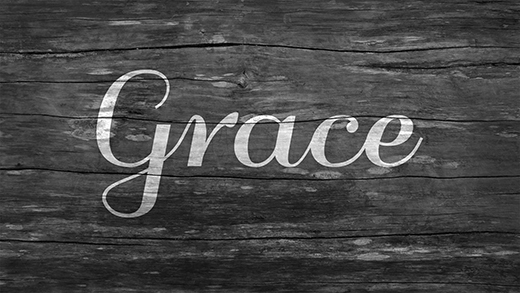Grace
It’s autumn. The air is markedly crisper and somehow louder, able to carry more, than the recently warm summer mornings – it is able to carry coldness. Coldness is heavier. Smells seem sharper in autumn too. I walk my regular post-school-drop-off-pre-work route, wondering how my daughter, Saskia, will spend the first week of term two. Yellowed, dried-out primary school memories of mine mingle with fallen leaves that toss and crunch around my walking feet.
I see Grace, walking toward the same intersection, across from the stone Anglican Church. She’s walking slowly. There is a barely visible sadness in her slowness, a deep resignation, and tiredness – barely audible, loudly visible. My eyes move from Grace to the church notice board. A poster printed in large black letters reads: “Feeling low? Come in for a faith lift.”
“Morning Grace” I offer in an overly upbeat, energized, faith-fizzed way.
The pavement is athrob, like an artery pumping its cellular load, a flow of people – mainly domestic workers and scholars - all bobbing and weaving their way from the station into suburbia’s places of work.
“Hello” she sing-songs, breaking into a deeply warm smile of recognition.
“You look tired” I both ask and state, all at once.
“I am walking slowly because I am early for work today” she ducks the reflection and side-steps a stream of school children passing shoulder-to-shoulder.
“Ah” I say.
“What time do you start working?”
“Eight-thirty but if I arrive early, I start then.”
We join up, our strides sync and we establish a pace that is the compromise of her walking-to-get-there-later and my focused-calorie-burning-briskness.
Grace is a domestic worker who works at one of the large colonial houses in Kenilworth, just above the railway line. We pass one another every other day and have established a pavement familiarity that sees us incrementally grow our knowing of one another – a couple of questions, a few sentences at a time. I now know that Grace has school-going children, spent one year at university and is selling second-hand clothes I gave her weeks ago to help raise funds for a cake decorating course she wants to attend on Saturdays at a catering school in town.
Grace loves cooking; she has taken many courses and tells me today that she used to work as a chef, in the now defunct retirement home that was run by her present employer. When the retirement home closed down, her employer transferred her to the family home.
“When I moved across there was a housekeeper at the house. She left after 2 months. I have been there now, on my own, for 13 years” says Grace.
I try to imagine the home and ask, “What do you do at the house every day?”
Grace is short, squat with a moon-shaped face and large, sparkling eyes that communicate an almost permanent expression of playful mischief – pools of brown liquid humor waiting to overflow. There is the slightest tinge of yellow, a jaundiced yellow that speaks of an ailing autumn interior.
Her expression becomes fleetingly serious; the liquid humor vaporizes and is replaced with a murky mindless mistiness – one I recognize in those who carry a heavy burden that they rarely share.
She adopts the tone and posture of a storyteller, looking in on her life at the big house. She describes the upstairs area with its many bedrooms, three bathrooms, and the massive downstairs kitchen.
“It is so big, like a proper catering kitchen, it takes up the entire wing of the downstairs area, at the back. And the big dining room and a very big walk-in freezer,” she uses her arms to show me.
“Each day I start, I am supposed to have tea time and lunch time, but I prefer to work straight through so that I can leave early, to get home to help the children with their homework and to cook for them.”
She’s left the pavement we’re sharing and she’s walking me through her day, filling in details that allow me to navigate side by side, looking over her shoulder – into her domestic life.
“So you trade teatime and lunchtime for time with your children?”
“Yes, but most days I’m so tired when I get home, I have….” her voice trails.
“I don’t have the energy I used to have; the energy is not the same. My body is getting old.”
A sad, weary, resigned smile crosses her moonscape.
“Yes, the body slows down” I offer, acutely aware of the ache in my eyes and the dull moan at the base of my spine. Our middle-aged bodies bind us in an unspoken sisterhood.
“What does your day look like, what have the days of the past 13 years looked like?” I ask, curious for more. I don’t know why I want her to tell me. The question comes through me, not from me, it feels.
“On Monday’s, I clean upstairs, well, make all the beds, tidy, clean all three bathrooms, vacuum, dust, make everything right” she honors my question.
“Tuesdays I do downstairs, properly, the dining room. Every day, the kitchen, the washing and ironing. They have one child still at school so every day I do washing and ironing. And I make food, everyday. Every day, the bathrooms upstairs, the kitchen – all that, everyday….” She pauses briefly.
“And the cottage outside, I also clean the cottage outside.”
The sheer weight of 13 years of “every day” descends. I buckle at the iron-clad tedium and relentlessness of the load.
“Wow, that’s an awful lot of work for one person” I respond lamely, softly, not wanting to make light of her burden.
“Yes, a very big job for only one person and I am not young anymore” she replies, almost as though she’d only just understood – for the very first time – the enormity of her workload. Perhaps it is I who has heard for the very first time too.
I watch her, watch our joint awareness ripple outward like a pebble-disturbed pool.
“You know” she continues
“This past weekend was my son’s birthday. For the first time, I forgot to bake him a cake. I was so tired, I just forgot.”
Her tone is confessional. I feel priest-like, taking a scared sharing.
“Do you know what he said to me?”
I know the question is not posed as one that wants an answer. I answer anyway.
“No, I don’t know, what did he say to you?’
“He said, mommy you don’t love me. You forgot to make me a cake on my birthday so you don’t love me”.
Anguish floods her moon face. Dark side of the moon.
I look away, priesthood shattered; culpable I am in my white privilege. The many domestic workers who have silently cleaned, washed, ironed, vacuumed, tidied, dusted, carried, cooked, folded, scrubbed, polished, relentlessly served – encircle me now. The women who raised me while my own mother worked, image themselves into the present moment. I stand bewildered in my own complicity.
She saves me from the strangle-hold of guilt and self-recrimination – making their way like poison – and generously continues.
“No, I said to my son, no, it does not mean I do not love you. It just means I am tired and I forgot because I have been working too hard” she said, her voice redemptive and forgiving, even soothing.
After a silence, Grace adds a reflective post-script “My children will not come to the house anymore. My son asks why I work so hard for those people. He reminds me that I am a chef, that I have one year of university education, that I can find something else.”
She allows her son’s reclamation of her to wash over her, over me.
“He is angry because you are being exploited” I say.
She nods kindly, voiceless.
Moistened by the shower of her son’s unlived possibilities for her, Grace and I stop at the place where our paths separate. She is walking straight on. I am turning down the road to fetch my newly acquired walking companion, Colleen, from the station.
“Why don’t you ask for help?” I helplessly suggest in parting. She is on the other side of the road by now.
“I have” she shouts across the noise of traffic “my boss says she can’t afford to employ someone else”. Her face beams at me with mischievous irony.
“It sounds like it might be time for a smaller home, with less bathrooms….a smaller home so that you can save some energy for that cake decorating course you’re wanting to do?” I venture, tentative, unsure whether my advice is even vaguely useful or possible or relevant.
She turns and walks, her head shaking from side to side.
As I walk from her, she radiating moonshine, I hear her chuckle “We will see what happens”.
Her back to me, I feel lost. I feel a sense of overwhelming loss – lost for words, lost for understanding, lost in finding a way to bridge the worlds of madam and maid…
She walked on, I walked on and Grace lingered…
All day long, Grace clung to me and spoke, over and over again, about how grateful I am for pavement wisdom and walking in the world. On the pavement, Grace and I walk and talk and one step at a time, one small encounter at a time, day after day, we encounter GRACE and grace speaks.
#End#
By Jackeline Plank





